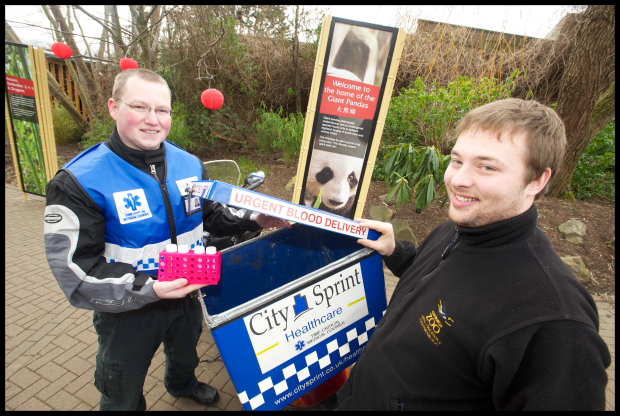Testing Testing - Edinburgh Zoo gets ready for their first panda breeding season

MANDATORY CREDIT PIC: ROB MCDOUGALL
ROB MCDOUGALL – PHOTOGRAPHER
07856 222 103
info@robmcdougall.com
www.RobMcDougall.com
Testing has begun on important samples that will help keepers predict when the time is right for Tian Tian and Yang Guang.
As the big day, or night, gets closer, Edinburgh Zoo has started to collect urine and vaginal swabs that, combined with a fuller picture of Tian Tian’s behaviour, will provide a clearer indication of when the magic panda could happen.
Early each morning panda keeper Alison Maclean collects a urine sample and then each afternoon one of the Zoo’s veterinary team vaginally swabs female Tian Tian to accumulate essential data for her the panda team.
Currently on a weekly basis, samples are transported by medical couriers CitySprint to Dr Susan Walker at Chester Zoo Endocrine Laboratory where she performs important tests to determine the level of Tian Tian’s hormones. As soon as a rise in panda hormones is detected, urgent sample delivery will start on a daily basis so keepers are certain not to miss the narrow window of opportunity where Tian Tian is receptive to potential mate Yang Guang.
Iain Valentine, Director of Research and Conservation at Edinburgh Zoo, said: “The scientific work behind the scenes has very much begun. It is vital for us to have as full a picture as possible of when Tian Tian is receptive to mating, as the window will only be 3 days.
“Although not with each other, both pandas have bred before and we are fairly optimistic we can achieve a successful panda breeding. Signs have been positive to date and Tian Tian has had time to get used to the scents and sounds of Yang Guang.
“Primarily dictated by light levels, which are different here to the part of China the pandas are from, we do not know exactly when Tian Tian will be in season. However, we expect it to be between the start of March and anytime up to very early May.”
Patrick Gallagher, CEO of CitySprint, comments: “Tian Tian’s samples are carefully transported by our specialist healthcare team with great pride every week. We are delighted to be involved in such an exciting and important part of the pandas stay at Edinburgh Zoo.”
Dr Sue Walker, Endocrinologist at Chester Zoo, says: “When the urine samples arrive we take them over to our endocrinology lab and start to run tests on them. These are similar to urine tests that are done in humans.
“We are looking for hormones in the urine; specifically a rise in estrogen concentrations. This rise in estrogen will coincide with breeding behaviour in the panda and allow keeping staff to determine the most appropriate time to introduce them for breeding.”
Source: Edinburgh Zoo









